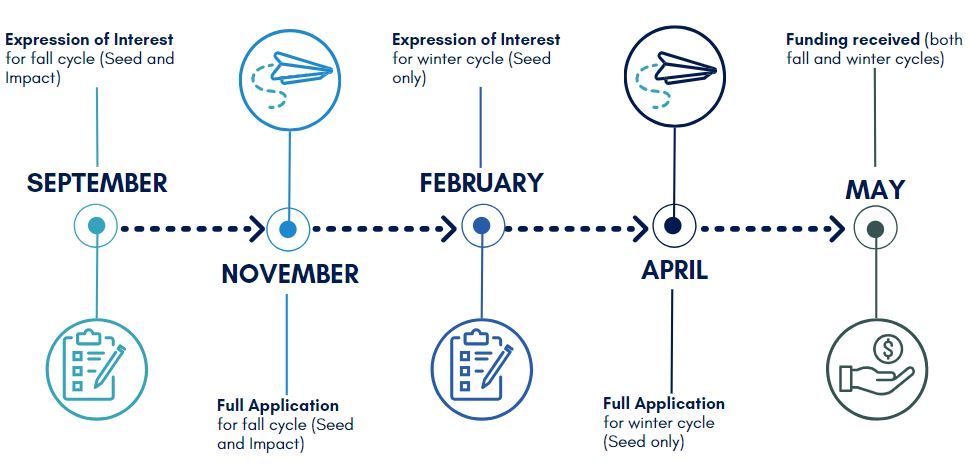LEAF Evaluation Criteria & Application Process
LEAF Navigation
The following pages are designed to support you throughout the LEAF process:
- Eligibility and Funding Streams
- Evaluation Criteria and Application Processes (below)
- Teaching Grant Resources
- Submit an Expression of Interest
LEAF Selection
The Learning and Education Advancement Fund (LEAF) Selection Committee is comprised of faculty who have significant experience in implementing and evaluating teaching and learning projects. The Selection Committee consists of tenure- and teaching-stream faculty members:
- Vice-Provost, Innovations in Undergraduate Education (Committee Chair).
- Director, Centre for Teaching Support & Innovation.
- Four Faculty representatives, two of which shall be members of the President’s Teaching Academy.
Evaluation Criteria
The LEAF Selection Committee evaluates Seed and Impact LEAF project proposals according to the following criteria.
Criteria for Seed and Impact Grants
Additional Criteria for Impact Grants
Application Process
| Step | Details |
|---|---|
| 1. Confirm your eligibility for LEAF. | Review the LEAF Eligibility Requirements. Review the LEAF Evaluation Criteria for your project’s eligibility. |
| 2. Complete a LEAF Expression of Interest (EoI). | Fall Cycle (Seed and Impact Grants) Expressions of Interest due September 17, 2025 Winter Cycle (Seed Grants only) Expression of Interest due February 23, 2026 |
| 3. Attend a consultation with the OVPIUE. | Within two weeks of receiving an EoI, a member of the OVPIUE will invite the project lead(s) to attend a consultation to learn more about the project and discuss ways to help strengthen the project proposal. Before advancing to the full application, project lead(s) are required to contact their Dean’s Offices to establish eligibility and determine divisional processes. |
| 4. Receive feedback on your EoI. | Following the consultation, the OVPIUE will share the EoI and feedback gathered from the consultation with your applicable Dean’s Office. This is to ensure divisional awareness and support of potential projects. In addition, the Dean’s Office will be invited to share any pertinent feedback and resources. The OVPIUE will then share all feedback with project lead(s). At this stage you will be informed if your project is eligible to proceed and you will be given a link to the full, online LEAF application. |
| 5. Submit full application. | With the online application, please note you will be unable to save your work on the application and then return to work on it at a later time. You might consider drafting the application in a word document. A draft template of the full application form is available for download at the bottom of this table; however, no hard-copy or email submissions will be accepted. Within the submitted application, you will be required to upload 1) a letter of endorsement from a Dean or Dean’s designate, 2) a letter of endorsement from your academic program head / chair (in departmentalized faculties) and 3) a budget for your project, using the LEAF budget template. Fall Cycle (Seed and Impact Grants) Full Application due November 25, 2025 Winter Cycle (Seed Grants only) Full Application due April 28, 2026 |
| 6. Receive confirmation. | After the Selection Committee evaluates all proposals, applicants will receive a letter with the results of their LEAF application. You may also be asked to meet with members of the OVPIUE to discuss the Committee’s feedback. Fall Cycle (Seed and Impact Grants) grant applicants will receive their letter in January. Winter Cycle (Seed Grants only) grant applicants will receive their letter in June. |
| 7. Receive funding. | Approved project proposals For projects will receive funding for year 1 in June, for both Fall and Winter Cycles. If your application is successful and require funding before June, please reach out to the OVPIUE to discuss funding options. |
For more resources to support your LEAF application, visit Teaching Awards & Grants Resources.
LEAF Timeline

Contact
LEAF is sponsored by the Office of the Vice-Provost, Innovations in Undergraduate Education. For more details about LEAF, please contact vp.iue@utoronto.ca.
